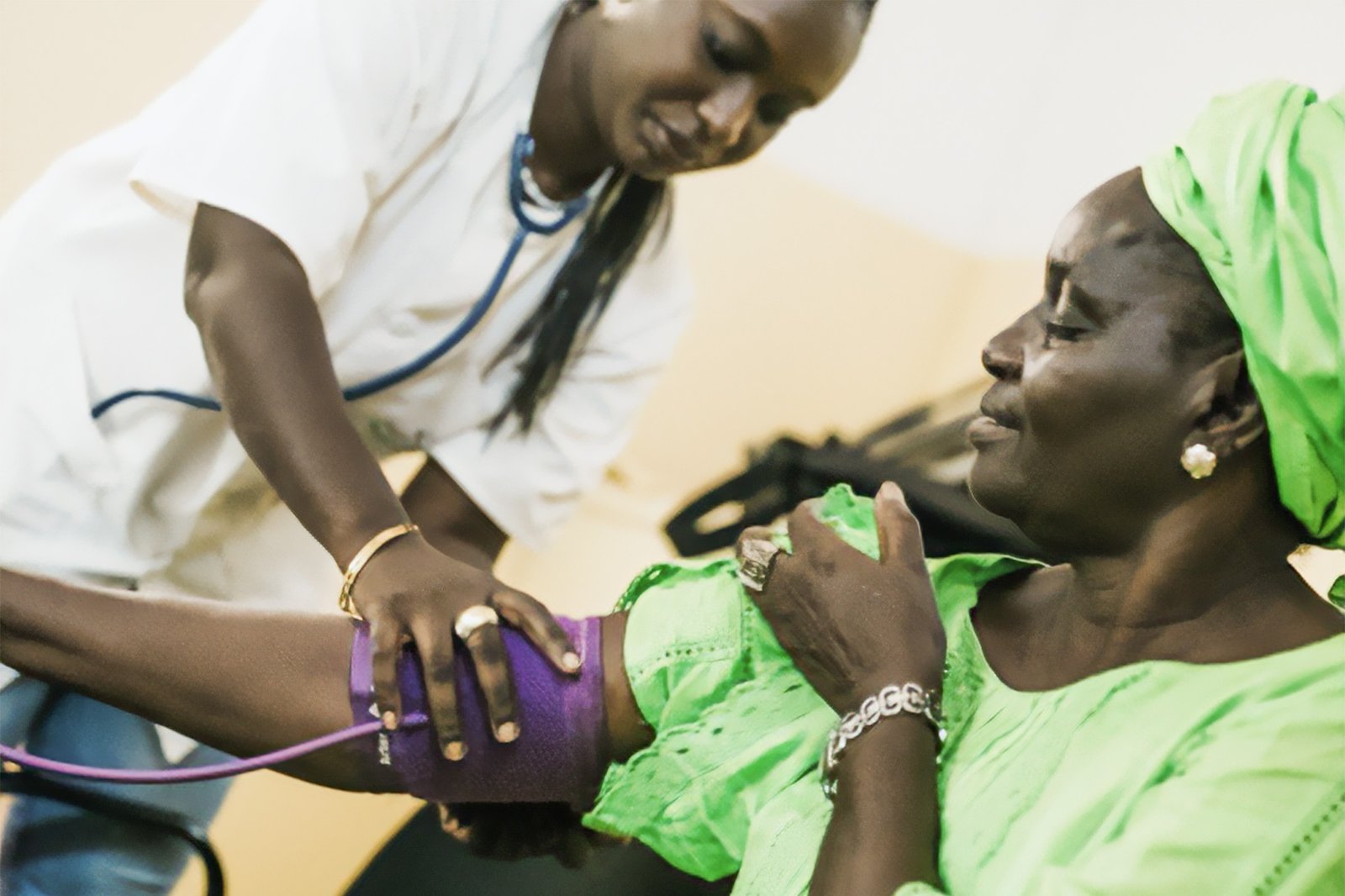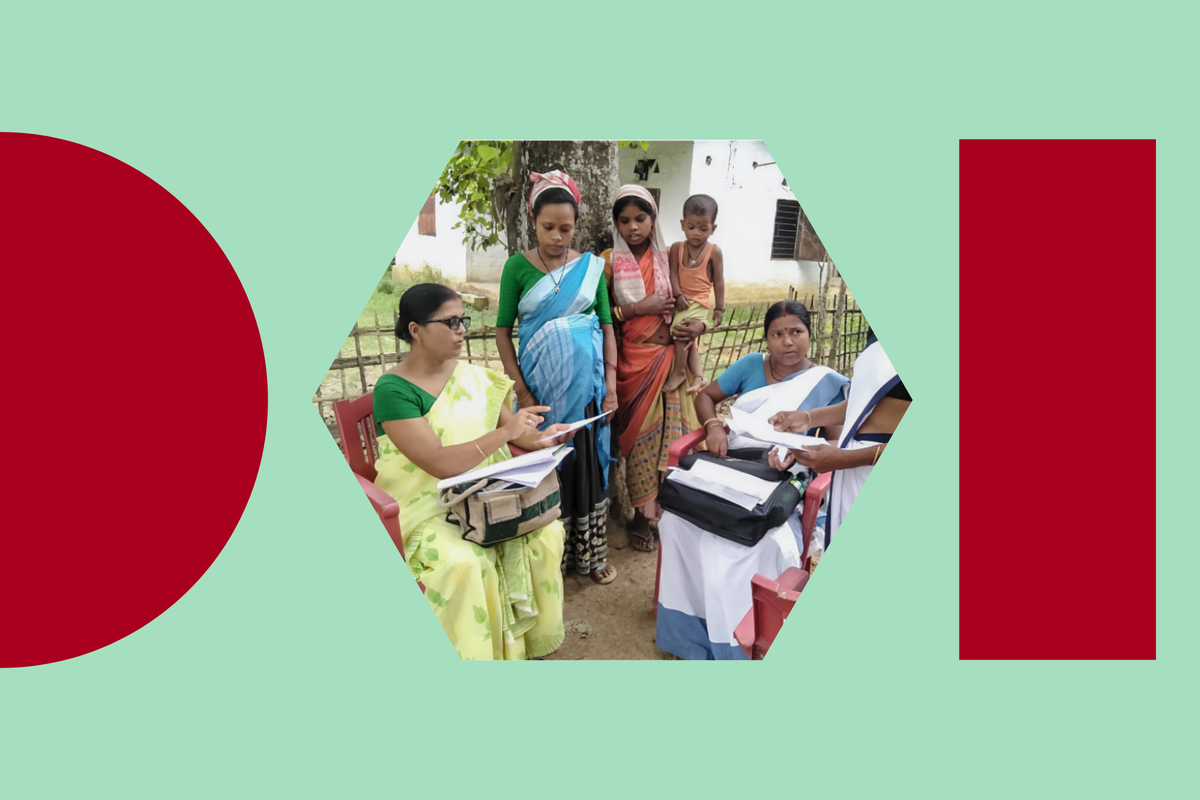Strengthening Kenya’s fight against HIV and TB
In Nyamira County, Kenya’s government is strengthening HIV and tuberculosis (TB) health services by bringing them closer to people’s homes.
With support from the Astellas Global Health Foundation, PATH partnered with Nyamira County to improve HIV and TB services delivered by community health promoters—the county’s 1,379 frontline health workers. The project built a comprehensive community health workforce database, identified training gaps, and launched mentorship visits to build health promoters’ skills and reach.

Community health promoters listen while a nurse provides mentorship and training during a monthly meeting. Photo: PATH/Caroline Wangire.
1 of 2 2 of 2
2 of 2
In 2024 alone, health promoters screened over 114,000 people for TB and referred nearly 7,800 people for HIV testing. The project also equipped community health teams with smartphones and tablets, upgraded data systems, and enabled faster, more informed decision-making.
Crucially, the initiative supported advocacy activities for new policies on long-term financing of community health, including fair compensation for health promoters. As Mathew Abuto, Nyamira’s Community Health Services Coordinator, said, “This support came at a time when the county was intentional in revamping community-level HIV and TB service delivery.”
Nyamira’s success now serves as a model for other counties—showing that investing in community health systems is key to advancing universal health coverage and defeating HIV and TB.
Bringing services home for children with disabilities
In sub-Saharan Africa, about 10 percent of children under age five have developmental delays or disabilities. But in Mozambique, less than 1 percent are identified by health services—meaning most go without early support that could change their lives.
To close this gap, PATH partnered with the Associação dos Deficientes Moçambicanos (ADEMO) to improve care for children with disabilities. Together, we launched an enhanced community-based rehabilitation model in Monapo District, Nampula Province, bringing vital services directly to families.

PATH and partners piloted a community-based rehabilitation model to meet the needs of disabled children. Photo: PATH/Debjeet Sen.
1 of 2 2 of 2
2 of 2
Through home visits, peer parenting groups, and better referral systems, the project increased the number of children receiving support. Volunteers were trained to build low-cost rehab tools from local materials and guide caregivers in simple techniques to help their children thrive at home.
The impact was profound: early detection rose, referrals for clubfoot within one month of birth grew from 25 to 40 percent, the number of children receiving physiotherapy nearly tripled, and nearly all caregivers enrolled saw improvements in their children’s conditions.
Notably, 60 percent of children identified by ADEMO had never been referred to a health facility before. ADEMO’s improved capacity has readied them for expansion into additional districts in 2025. This local partnership model proves that bringing care closer to home can drive powerful, inclusive change for children and families.
Supporting mothers’ mental health in wartime Ukraine
In war-torn Ukraine, the emotional toll on pregnant women and new mothers is immense. Displacement, trauma, and isolation have made this vulnerable time even more difficult—yet maternal mental health services remain scarce, particularly in frontline and rural areas.
To address this need, PATH launched a maternal mental health initiative in three Ukrainian regions. The program focuses on practical ways to increase support for women facing perinatal depression—starting with frontline health workers.

A mother holds her newborn at a birthing center in a maternity hospital in Mykolaiv, Ukraine. Photo: PATH/Mike Wang.
1 of 2 2 of 2
2 of 2
In 2024, PATH trained 88 nurses and doctors—many without prior mental health care experience—to identify signs of perinatal depression and provide early, compassionate support during pregnancy and postpartum care.
Support extends beyond clinics. Workshops and peer-led self-help groups offer women safe spaces to connect, share, and support one another—breaking isolation and normalizing mental health conversations.
Importantly, the initiative is designed for long-term impact. By integrating mental health into routine maternal care, it ensures ongoing support without needing specialized providers. Since the initiative began, at least 70 percent of mothers have received postpartum support.
Boosting health and well-being through community sports
Regular physical activity offers powerful benefits—from reducing the risk of health conditions such as high blood pressure and diabetes to boosting mental health, well-being, and brain function. Yet most people aren’t moving enough: 81 percent of adolescents and over a quarter of adults worldwide fall short of recommended activity levels, putting their health at risk.
To address this challenge, PATH leads implementation of the Community Sport and Health Cooperation Initiative in Ghana, Nepal, Peru, Tanzania, and Vietnam. The initiative is led by the International Olympic Committee and the WHO and aims to bring together groups working on sport, education, and health to co-create community programs that promote regular physical activity and lifelong health.

School children in Vietnam play football as part of the Community Sport and Health Cooperation Initiative. Photo: PATH.
1 of 4 2 of 4
2 of 4

People in Ghana participate in aerobics as part of the Community Sport and Health Cooperation Initiative. Photo: PATH.
3 of 4 4 of 4
4 of 4
At its core is collaboration. National and local groups—including government ministries, National Olympic Committees, WHO, youth clubs, schools, and health facilities—identify local priorities and deliver activities together, embedding sport into daily life.
Since launch, 628 practitioners have been trained in sport-based community programming, and 189 organizations have strengthened their ability to deliver healthy, inclusive activities. More than 112,000 people have participated directly, and over 1 million have been reached with messages promoting the value of staying active.
By making sport a part of everyday life, the initiative is helping people move more and live healthier—proving the power of partnership to transform community well-being.
Improving care for underserved mothers and children
The US government–funded Saksham project reached over half a million pregnant women across India with lifesaving maternal and newborn health care in 2024. Focused on underserved regions like Assam’s tea plantations and tribal districts in Chhattisgarh and Odisha, the project combined community-led efforts with stronger health facility services.
In Assam, early antenatal care registration rose by 22 percent, and more than 150 tea garden hospitals saw quality improvements, prompting the state government to request the Saksham team’s support in applying similar efforts across all 15 tea-growing districts and establishing learning forums to sustain progress.

An anganwadi (frontline) worker informs an expectant mother about the government’s wage compensation scheme. Photo: Guwahati Art Club/Niloy Jyoti Talukdar.
1 of 3 2 of 3
2 of 3
 3 of 3
3 of 3
In Chhattisgarh, high-risk pregnancy identification rose by 300 percent at trial sites, leading to statewide expansion. And in Odisha’s Rayagada district, the project’s community approach led to a 70 percent drop in home births, with more deliveries taking place in safer health facilities. The success led the state to recommend expanding the program to 29 blocks across 16 districts.
With over 4,200 health workers trained and services improved in more than 280 facilities across 64 districts, the Saksham project is driving lasting impact. Next: broadening these efforts in close collaboration with state governments.
Transforming NCD care in Africa through service integration
Chronic health conditions like high blood pressure, diabetes, and kidney disease are rising rapidly across Africa. By 2030, these noncommunicable diseases (NCDs) are projected to cause nearly half of all deaths on the continent. The burden could soon overwhelm health systems—but PATH and partners are working together to address the growing need. For example, PATH works with AstraZeneca on their Healthy Heart Africa (HHA) program.
Through HHA, PATH integrates NCD care into existing services like those for HIV and malaria in Burkina Faso, The Gambia, Mozambique, and Zambia. This means people can get screened and treated for multiple conditions in a single visit—saving time and improving outcomes.

A health worker participates in a training on noncommunicable diseases. More than 400 health workers in Ghana received such training through PATH-supported projects and programs. Photo: PATH/Gabe Bienczycki.
In Ghana, Rwanda, and Senegal, the program brings hypertension and chronic kidney disease care closer to communities by training health workers and equipping more clinics with the necessary tools. So far, PATH and HHA have screened over 5 million people and connected many to long-term treatment.
By embedding NCD services into everyday health care, this approach strengthens entire health systems and helps millions get the care they need—right in their own communities.
From vaccines and diagnostics to medical devices and digital tools, PATH creates and introduces health products that meet local needs and save lives.
From training health workers to advancing effective policies, PATH partners with governments and local organizations to strengthen health systems at every level.
2024 PATH annual report
Annual report home | Product development and access | Health and disease management | Health systems strengthening | Financial summary | Leadership | Supporters
